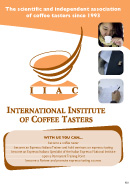by Carlo Odello
We met Gennaro Pelliccia, Production Technical Manager at Costa, he makes sure that the quality of the coffee they produce is good value-for-money. He started off with Costa as a barista in December 1991, then he joined Gino Amasanti at the Roastery in 1997 after his studies in Mechanical Engineering.
First of all, let’s find out something more about Costa: its history and what it is today.
Costa was set up in London in 1971 by two Italian brothers, Sergio and Bruno Costa. The two of them noticed that there was some demand for good-quality, blended coffee so they started supplying such a product to catering services and specialised Italian coffee shops in the UK. In 1978, the Costa brothers opened up their first store in London. This was the beginning of their expansion with two new selling points being opened every year. In 1988, they moved to a bigger site, in the Old Paradise Street, in the Lambeth area, south of London. In 1995, Costa was acquired by the Whitbread Group: at the time it had 41 stores all around the country. Today it is the leader in its sector and it is also the operator growing at the fastest pace: at present, it has 600 stores in the UK and 222 abroad.
 What does the coffee market in the UK look like?
What does the coffee market in the UK look like?
According to April 2007 figures, there are approximately 9.300 stores which comprise branded coffee shops, independent and unspecialised operators. It is assumed that there will by a growth by 4.2% per annum which will lead to having 11.000 stores in 2010. As for branded coffee shops, the big chains market, from 2001 to 2006, there was a 10% growth per annum. At present, there are 2.973 stores of this type in the UK: the market share of the branded chains accounts for 32% of the global British market; this percentage should get up to 37% by 2010.
Do you believe that there is still margin for growth for Costa?
Yes, undoubtedly. Twelve years ago we carried out an investigation that made it clear that the market was open to the creation of places, not dominated by males, as is often the case with pubs, where people could meet. This was the ground on which the further development of Costa was built. There has been a positive growth trend for coffee shops also due to a major change in eating habits in the UK over time. Today people do not eat at home most of the time and tend to prefer quick snacks. This is the reason why the coffee shop is the ideal solution.
Let’s speak about quality in the UK.
No doubts that over the last 10 years espressos and cappuccinos are much better in our country. This is also thanks to the clients. Over the last five years, our most evolved clients – those that, after having been to Italy, asked us to offer products which were to a greater extent Italian-style. In addition, the attitude to the product is different: once upon a time, the espresso was chosen because it was probably the cheapest option on the menu. At the beginning there was also a certain linguistic concern triggered by words the pronunciation of which was deemed to be difficult, e.g. ‘caffè espresso’ or ‘latte macchiato’. Actually, nowadays, it is a real choice, part and parcel of the life-style.
How about the future?
This looking for Italian-style products and for better quality will not cease: whoever will not be able to meet this need will have no chances in the market. The next step will actually be the choice of the coffee shop depending on the quality. Costa has already prepared itself for picking up this challenge in an effective way. We measure ourselves against the parameters set by the Italian Espresso National Institute and we use machines and grinder-dispensers that are certified by the Institute. However, the monitoring is not just downstream, at the coffee shop, it starts well in advance on the entire production cycle.
Back to British consumers, do they tend to be loyal to brands?
They are, first of all, loyal to the experience of taking an espresso or a cappuccino in a certain type of place. For example, several clients of Costa are professionals who stop at the same coffee shop on their way to work or when returning home. Our baristas know their tastes and make them feel as if they were at home by offering a tailor-made service. So the clients are loyal because of that atmosphere and that place which looks familiar to them. The very wide product range gives them satisfaction and plays a role in making them loyal.
What is your view on single-dose coffee pods, and, more in general, on any solution that makes the espresso experience possible without a coffee shop?
In the UK there is for sure a developing market for consumption at home of this type of products, though we must not forget that most of the coffee drank at home is instant coffee. The single-dose coffee pods, or other solutions of this sort, are still not too common neither at home nor at the office. In the UK they are becoming increasingly popular at places that are not specialised in coffee, e.g. pub restaurants, where at the end of a meal some clients simply like to have a cup of coffee. In these places, the low sales volume and the high frequency in staff turnover make it difficult to afford having the proper complete machinery and the blend in the form of beans. This is the reason why they opt for the professional espresso machine with filter-holders for single-dose coffee cartridges. Also in the Costa stores we use this sort of solutions for the decaffeinated and Fair Trade products in order to be able to serve a product which is always fresh.
What is the policy of Costa Coffee on the international stage?
Currently, we have more than 200 stores all over the world: Ireland, Eastern Europe, Middle East, India and Pakistan. For the moment being, we have got no plans to enter Italy where there are already independent and well-rooted suppliers that provide an excellent product to the country. In general, in Italy, branding policies are not too strong yet.
 What does the coffee market in the UK look like?
What does the coffee market in the UK look like?
